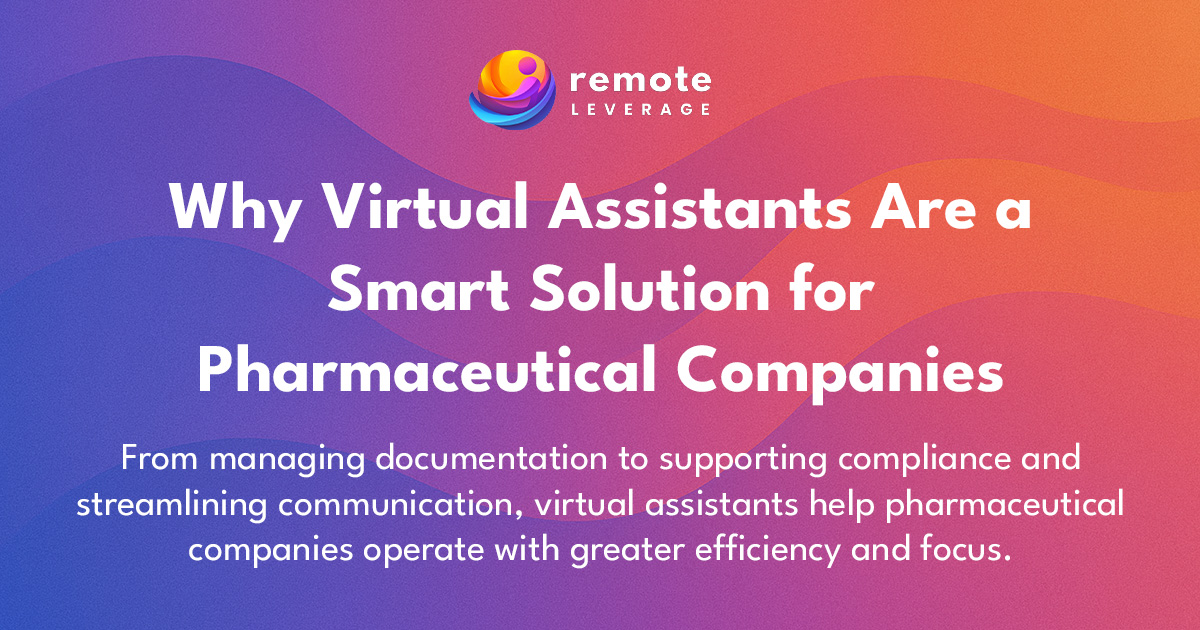
The pharmaceutical industry demands precision, compliance, and constant coordination. Behind every clinical trial, launch plan, or research pipeline is a mountain of documentation, communication, and project tracking.
As regulatory pressures increase and operating costs climb, many pharmaceutical companies are turning to a flexible, scalable solution: virtual assistants.
A virtual assistant (VA) can help support time-sensitive tasks and documentation workflows, allowing internal teams to stay focused on science, safety, and strategy.
Here’s how virtual assistants can support pharmaceutical companies in a big way.
Documentation is the backbone of pharmaceutical operations. Whether you’re preparing clinical data, tracking submissions, or managing SOPs, it’s critical that files are organized, labeled, and accessible.
A virtual assistant can:
By keeping your documentation process clean and accessible, a VA helps reduce delays and supports audit readiness.
While VAs cannot replace certified compliance officers, they can provide essential administrative support that helps teams stay organized and compliant.
Your virtual assistant can:
This frees your compliance and legal teams from time-draining reminders and document prep.
Busy pharmaceutical teams often struggle with complex scheduling needs across departments, time zones, and external partners. A VA can streamline the process.
Common calendar-related tasks:
Less time scheduling means more time focusing on core responsibilities like R&D or strategic planning.
Pharma firms—especially those in sales, medical devices, or biotech—benefit from organized, consistent communication with both providers and clients. A VA can help manage key touchpoints in your CRM and inbox.
Tasks your VA can handle:
The result is improved communication with providers, researchers, and partners—with fewer things slipping through the cracks.
Marketing and business development in the pharmaceutical world require consistency, coordination, and responsiveness. VAs can play a big role here.
Tasks include:
With VAs supporting these activities, your business development and marketing teams can stay focused on strategy rather than admin work.
Q: Are virtual assistants trained for the pharmaceutical industry?
While VAs are not licensed pharmacists or compliance officers, they are highly skilled in administrative support, project coordination, and documentation management. With Remote Leverage, VAs are pre-vetted and trained in common business and organizational tools used in pharma.
Q: Are virtual assistants secure enough for sensitive work?
Yes. VAs from Remote Leverage operate under strict confidentiality agreements and use secure cloud-based systems to protect data integrity and compliance.
Q: How many hours should a pharma company start with?
Most clients begin with 20 hours per week, which provides consistent support without the cost or complexity of a full-time hire.
Pharmaceutical companies need to move fast, stay compliant, and communicate clearly across teams and partners. But growing internal teams isn’t always the best or fastest solution.
Hiring a virtual assistant gives you:
✅ Admin and coordination support
✅ Scalable capacity without overhead
✅ Better documentation and communication
✅ More time for your in-house experts to focus on high-level work
Whether you’re in early-stage biotech or a global pharma brand, VAs provide essential behind-the-scenes support that keeps your operations smooth and strategic.
At Remote Leverage, we match pharmaceutical companies with pre-vetted, college-educated virtual assistants who work your hours and understand your industry’s demands.
✅ Fluent in English
✅ Professional and organized
✅ Trained in modern tools and communication
✅ Matched to your workflow
Build the support system your team deserves—without slowing down your science.